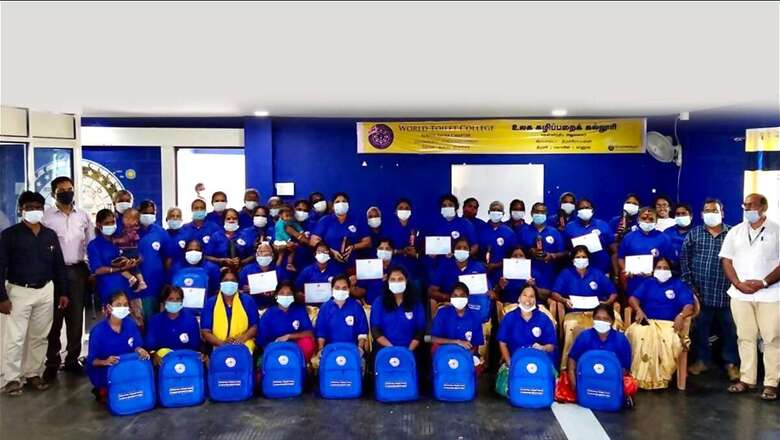
views
Mahatma Gandhi, the beloved father of our nation and a tireless advocate for cleanliness, once shared a profound insight: “Sanitation is more vital than political independence.” India’s remarkable journey towards sanitation, guided by the Swachh Bharat Mission, has been nothing short of inspiring, drawing us closer to the realisation of several United Nations’ Sustainable Development Goals (SDGs).
Yet, amidst this awe-inspiring transformation, there is one community of heroes that remains unsung: the dedicated community of sanitation workers. It is thanks to the tireless labour of these individuals that our waste is managed safely, and our cities remain clean and hygienic. Every single day, more than 5 million sanitation workers from all corners of the country put their lives on the line, ensuring that we have uninterrupted access to fully functional sanitation services, and this remained true even in the face of a global pandemic.
Harpic, as India’s leading brand in the lavatory care segment has a deep and nuanced understanding of the challenges sanitation workers face, particularly women sanitation workers. These women often are at the receiving end of a triple prejudice – one for being a sanitation worker, one for hailing from a backward class or caste, and one for being women. Harpic leveraged their understanding of these challenges into a real world solution in the form of the Harpic World Toilet College (HWTC) in 2016.
HWTC was established with the stated objective of improving the quality of life of sanitation workers through their rehabilitation by linking them with dignified livelihood options. Workers trained by the college are provided placement with various organisations. Following the successful proof of concept in Rishikesh, HWTCs have opened in Maharashtra, Aurangabad, in partnership with Harpic, Jagran Pehel and Maharashtra Government.
Thankfully, the HWTC isn’t simply performing lip service here. There is an enormous amount of thought, and understanding that has gone into creating the curriculum, the training pedagogy and the placements. When the aim is to change lives, details matter.
Creating a Strong Foundation Through Effective Training
HWTC recognizes that these women often come from marginalised communities and face numerous challenges in their profession. Many of these women are illiterate, and therefore, the training pedagogy needs to take into account their needs.
Practical Skills for Safe Sanitation
One of the key elements of HWTC’s training approach is the focus on practical skills. Sanitation workers need to understand the intricacies of their work, from handling waste to cleaning and maintaining public facilities. The training programs at HWTC include hands-on experiences, ensuring that these women are well-prepared for the realities of their jobs. This includes training on the proper use of cleaning tools, protective gear, and waste management techniques.
Health and Safety First
HWTC incorporates rigorous health and safety modules into its training programs as the work that sanitation workers do is intrinsically hazardous. These modules cover topics such as the prevention of infections, the proper handling of waste, and the use of personal protective equipment (PPE).
This emphasis on health and safety not only protects the well-being of these workers and their families, but also contributes to the overall hygiene and sanitation of the communities they serve. When sanitation workers are well-informed about health risks and safety measures, they are less likely to suffer the hazards of infections themselves, and far less likely to take these infections home to their families.
Confidence Building and Personal Growth
Beyond technical skills, HWTC’s training approach focuses on personal growth and confidence building. Many women sanitation workers face societal stereotypes and biases. Through education and skill-building, they gain the confidence to challenge these norms and excel in their roles.
Self-Esteem and Dignity
Sanitation work is often stigmatised, and sanitation workers often face discrimination. These societal messages combined with their often dire socio-economic situations can be fatal blows to one’s self esteem. HWTC reframes the work of sanitation from ‘unskilled’ dirty work, to a skilled profession that requires a specific set of skills and training to perform. Sanitation workers are also taught about the important role their work plays in keeping the larger community healthy and functioning.
Once they recognise these facts, the shift in perspective is a natural outcome. HWTC’s graduates see themselves as essential workers who play a key role in maintaining our society.
Leadership and Empowerment
HWTC goes a step further by fostering leadership skills among women sanitation workers. They are encouraged to take on leadership roles within their communities and advocate for sanitation improvements. This empowerment extends beyond their professional lives and influences their interactions within their families and communities.
Many women who have undergone HWTC’s training have gone on to become leaders in their neighbourhoods. They have successfully advocated for better sanitation facilities, educated their communities about hygiene practices, and challenged the stereotypes associated with their profession.
Walking the Path of Financial Security
As the HWTC also undertakes placements, most graduates emerge with jobs in the organised sector – with better pay, a provident fund, and insurance. They now have job security, and that security gives them a firmer footing in the world. Between better pay and insurance, they have the confidence to both save for a rainy day, and spend on the things they need to improve their circumstances.
For Harpic and HWTC, these stories are validation that what they are doing is making a real difference. Of course, that’s not all Harpic is doing.
For 3 years now, Harpic has partnered with News18 to create Mission Swachhta aur Paani, a movement that champions the cause of inclusive sanitation, equality for all genders, abilities, castes and classes and the strong belief that clean toilets are a shared responsibility. Mission Swachhta aur Paani brings together the right stakeholders on a common platform, so that issues of importance can be discussed, and solutions found.
Mission Swachhta aur Paani also leverages News18’s enormous reach to get these stories out to a larger audience, creating recognition and awareness of the part we play in creating and supporting unfair working conditions for women sanitation workers.
The beauty of awareness is that it spells action. When we realise the cost of our action (or inaction), we remedy it. We talk about it to our friends and families, and we spark movements – some big, and some small, that help move the needle towards a more fair, equitable and compassionate future.
We can be the change we want to see. Join us here, to learn how you can do your bit to help us transform into a Swachh and Swasth Bharat for all.




















Comments
0 comment